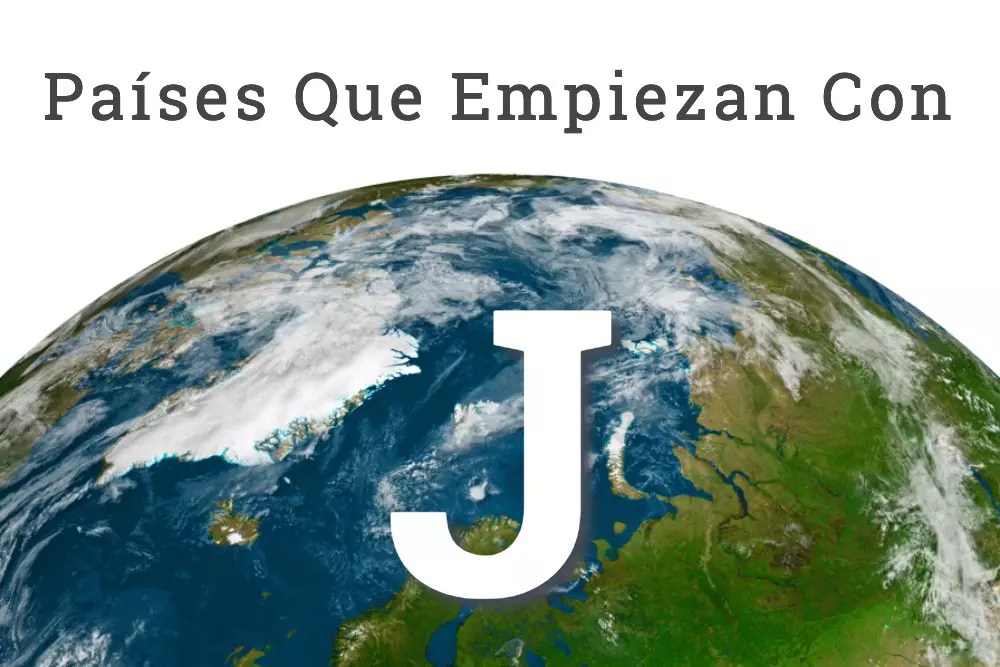When it comes to geography, many enthusiasts enjoy exploring the vast array of countries around the globe. One intriguing aspect is identifying countries that start with specific letters. In this case, we will be focusing on the fascinating world of "pais con j," or countries that begin with the letter J. This exploration not only broadens our knowledge of geography but also showcases the diversity and uniqueness that each country brings to the table.
In this article, we will delve into the countries that start with the letter J, examining their cultures, histories, and the reasons they are significant on the global stage. The quest for understanding "pais con j" may lead us to discover vibrant traditions, remarkable landscapes, and the rich heritage that these nations possess. Whether you are a seasoned traveler or simply curious about the world, this is an exciting journey worth embarking on.
As we navigate through the details of these countries, we will also address common questions that arise about them. From their geographical locations to their cultural significance, the information we uncover will undoubtedly enhance your appreciation for these unique nations. So get ready to explore the captivating world of "pais con j"!
What Are the Countries That Start With J?
When we think of "pais con j," two prominent countries come to mind: Jamaica and Japan. Both of these nations are rich in culture and history, each offering a unique perspective on life and society.
What Is the History of Jamaica?
Jamaica is an island nation located in the Caribbean Sea. Its history is marked by the Arawak and Taíno peoples before Christopher Columbus arrived in 1494. The island was later colonized by the Spanish and then by the British, which greatly influenced its culture, language, and societal structures.
Key Events in Jamaican History
- 1494: Christopher Columbus arrived in Jamaica.
- 1655: The British seized control of Jamaica from the Spanish.
- 1838: Slavery was abolished in Jamaica.
- 1962: Jamaica gained independence from Britain.
What Is the Culture of Jamaica Like?
Jamaican culture is vibrant and diverse, heavily influenced by its African heritage, British colonial history, and indigenous peoples. Music is a significant aspect, with reggae being the most famous genre, popularized by icons like Bob Marley. Jamaican cuisine is also notable, featuring dishes like jerk chicken and ackee and saltfish, which reflect the rich blend of flavors and traditions found on the island.
What Is the History of Japan?
Japan, an island nation in East Asia, has a history that dates back thousands of years. The country's rich traditions, art, and philosophy have been shaped by various influences, including Buddhism, Shintoism, and Confucianism. Japan's history is characterized by periods of isolation and rapid modernization, particularly during the Meiji Restoration in the late 19th century.
Key Events in Japanese History
- 660 BC: According to legend, the first emperor, Jimmu, founded Japan.
- 1185: The Kamakura period began, marking the rise of samurai culture.
- 1868: The Meiji Restoration led to significant modernization.
- 1947: Japan adopted its current constitution after World War II.
What Is the Culture of Japan Like?
Japanese culture is renowned for its unique blend of tradition and modernity. Traditional arts such as tea ceremonies, calligraphy, and flower arranging coexist harmoniously with contemporary pop culture, including anime and technology. Festivals, such as Hanami (cherry blossom viewing) and Matsuri (traditional festivals), showcase the country's rich cultural heritage and communal spirit.
What are the Economic Features of Jamaica and Japan?
Both Jamaica and Japan have distinct economic profiles influenced by their resources and historical contexts. Jamaica's economy relies heavily on tourism, agriculture, and mining, particularly bauxite. In contrast, Japan boasts one of the largest economies in the world, known for its advanced technology, manufacturing, and exports.
What Challenges Do Jamaica and Japan Face?
Despite their strengths, both countries face challenges. Jamaica struggles with issues such as crime, economic instability, and vulnerability to natural disasters like hurricanes. Japan, on the other hand, grapples with an aging population, stagnant economic growth, and natural disasters like earthquakes and tsunamis.
How Do Jamaica and Japan Compare?
When comparing "pais con j," Jamaica and Japan offer contrasting perspectives. Jamaica, with its laid-back lifestyle and vibrant culture, contrasts sharply with Japan's fast-paced, technology-driven society. However, both countries share a deep appreciation for their heritage and traditions, showcasing the diverse ways in which cultures can develop and thrive.
What Can We Learn From These Countries?
The exploration of "pais con j" provides invaluable lessons about resilience, cultural pride, and the importance of tradition in modern society. By understanding the histories and cultures of Jamaica and Japan, we can appreciate the richness of human experience and the diverse paths that nations can take.
Conclusion: Why Should We Explore Countries Starting With J?
In conclusion, the journey into "pais con j" unveils a world of diversity and richness, highlighting the unique characteristics of Jamaica and Japan. By learning about these countries, we not only expand our geographical knowledge but also deepen our understanding of cultural complexities. Whether through travel or study, exploring nations like Jamaica and Japan is a rewarding endeavor that fosters appreciation for the world's vibrant tapestry of life.
```
Kosas Dream Beam: Illuminate Your Natural Beauty
Creative And Unique Mom Names For Contacts
Hello Kitty Adventures: Can You Play With Friends In The Mobile Game?


